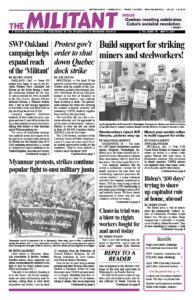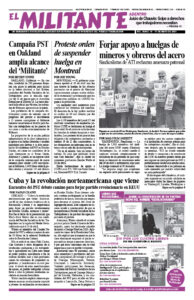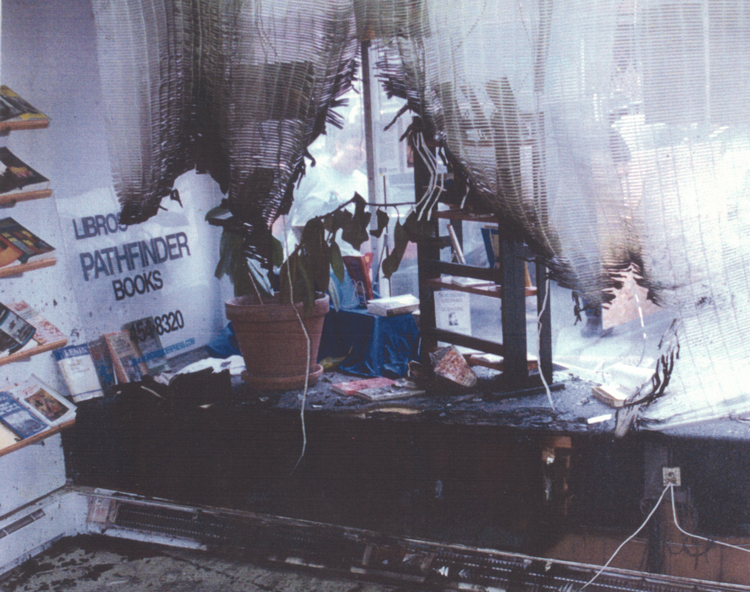Oral arguments were held before the U.S. Supreme Court April 26 on a lawsuit that challenges the state of California’s requirement that the over 100,000 charities registered there must hand over lists of major donors. The case poses an important issue for working people — the right to freedom of association and privacy without interference by the state, as guaranteed by the First Amendment to the U.S. Constitution.
State officials say they want the names to see if they suggest evidence of fraud, so they can prosecute. In other words, it’s a dangerous fishing expedition.
The case, filed by the Americans for Prosperity Foundation — set up and financed by conservative political activists Charles and David Koch — and the Thomas More Law Center, has won the support of an array of organizations. These include the Council on American-Islamic Relations, the American Civil Liberties Union and the NAACP Legal Defense and Educational Fund.
About a decade ago, California officials began demanding that any charity soliciting funds provide the state with a list of large contributors. Several groups challenged the forced disclosure rules, saying they could subject donors to violence and retaliation from political opponents. Members of the Americans for Prosperity Foundation have been physically attacked by middle-class radicals in a number of places.
In 2014 then California Attorney General Kamala Harris responded by insisting individuals’ confidentiality was protected by the state. But this wasn’t true. Over 1,800 contributor lists have been posted on the attorney general’s website.
After a legal challenge, a federal district court in California ruled against disclosing donors’ names in 2016. But the 9th Circuit U.S. Court of Appeals reversed this decision. That led to the Supreme Court case.
While a ruling isn’t expected until June, many justices in the April 26 hearing “seemed skeptical of California’s demand,” the New York Times reported. California is just one of four states with this invasive requirement on the books. “The brief filed by the ACLU and the NAACP Legal Defense Fund says that we should regard your system as a system of de facto public disclosure because there have been such massive confidentiality breaches,” Justice Samuel Alito Jr. told the lawyers for California.
“In this era,” Justice Clarence Thomas said at the hearing, “there seems to be quite a bit of loose accusations about organizations — for example, an organization that had certain views might be accused of being a white supremacist organization or racist or homophobic.”
Campaign finance disclosure laws
Liberal Justice Stephen Breyer, on the other hand, said there were good reasons to defend the California rules, expressing concern that ending this disclosure requirement could mean other such laws would be threatened. “This case is really a stalking horse for campaign finance disclosure laws,” he argued.
Taking advantage of growing mistrust by working people in the 1960s with the capitalist ruling parties — the Democrats and Republicans — liberals pushed so-called campaign finance reform. These laws, which require the public release of names and address of those giving funds to political candidates, attack workers’ political rights.
The ruling rich, who hold economic, political and military power, could always find ways around these laws. But working-class parties could be forced to expose the names and addresses of their members and supporters, making them subject to attack by government agencies and other anti-working-class outfits.
The NAACP Legal Defense and Education Fund — one of the groups backing the challenge to the California law — fought against “disclosure” laws as part of the mass movement to overthrow Jim Crow segregation. In the 1950s, the state of Alabama passed a law demanding the NAACP “disclose” the names of all its members, which would have opened them to the wrath of government officials and groups like the Ku Klux Klan. The NAACP fought this law and succeeded in getting the Supreme Court to overturn it in 1958.
In 1973 the Socialist Workers Party launched a political campaign and court suit that over the next 15 years exposed decades of FBI spying and disruption against the party, winning a court ruling ordering the FBI to cease and desist. Using evidence exposed through this fight, the party also won exemption from campaign finance requirements to turn over the names, addresses and workplaces of campaign contributors and its vendors, that held from 1974 to 2017. The SWP was the only party ever to win such an exemption by the Federal Election Commission.
In Washington state, teachers fighting to defend their union at Seattle Central College are battling a lawsuit by the anti-union Freedom Foundation that seeks to use state disclosure laws to get personal information on workers to go after those active in union-organizing efforts.
Last year state officials there threatened to disclose names and addresses of electors for the SWP presidential slate of Alyson Kennedy and Malcolm Jarrett. The party fought back, winning broad support, including from the state teachers union. State officials backed off.
“A victory in this Supreme Court case would boost all those fighting to defend their members and supporters from attack by the government, their political police and ‘cancel culture’ political opponents,” John Studer, chair of the Socialist Workers Party National Campaign Committee, told the Militant. “I hope Justice Breyer’s fears are justified, and we can use a victory to fight to end similar invasive disclosure requirements that target supporters of our campaigns.”


